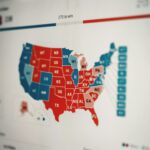Weekly Writers Round-Up: The Chinese Trade War, the Upside of Robocalls, and the Ineffectiveness of a Vaping Ban
Each week, we’ll be featuring opinion pieces from the alumni and current participants of AF’s Writing Fellows Program. A few highlights from the past week are below. Do you dream of having bylines like these? See here for info on how we can help make that a reality.
Trump vs. Xi, mano a mano by Tyler Grant (Summer 2018) in The Washington Examiner
A gaggle of economists and policy wonks gathered around the bargaining table haggling over trade terms doesn’t make for the greatest TV. And for the reality TV-star president and his Mao-acolyte rival, two mega-personalities accustomed to leveraging their public perception as a way of attaining and maintaining power, such closed-door diplomacy is even less glamorous still.
It’s no surprise, then, that oft-private trade negotiations have taken a public-facing persona with Chinese President Xi Jinping and President Trump. The result is a trade “war” that resembles a battle of wills more than an economic policy dispute, a one-on-one between Trump and Xi played out in the court of public opinion…
Robocalls may be annoying, but not all are bad by Krisztina Pusok (Fall 2017) in The Hill
Last month, residents of Washington, D.C. received over 26 million automated pre-recorded phone calls, also known as robocalls; that is an average of 47 robocalls per person, almost 4 times the national average. The problem is so pervasive that Americans lost more than $10 billion last year thanks to fake charity appeals and bogus IRS tax delinquency notices, among other robocall scams.
While robocalls have built up a bad reputation especially among consumers, it is less obvious that 60 percent are in fact “legitimate” robocalls — such as the ones that come from pharmacies, schools, or weather alerts. Not distinguishing between the useful and legal robocalls and the annoying and illegal robocalls could cause major problems for consumers, businesses with legitimate uses for robocalls, and ultimately on how enforcement agencies and wireless providers deal with the issue…
Banning Flavored Vapes Is the Worst Possible Response to Youth Vaping Fears by Andrew Wilford (Spring 2017) in Townhall
Say what you will about moral panics, but they do bring together strange bedfellows! That’s certainly been the case with concerns about flavored vapes. In announcing a forthcoming federal ban on most flavored vapes, President Trump sided with some unusual allies — namely the true-blue states of California and New York. But in truth, this is just another reminder that bipartisan ideas can be just as wrong as partisan ones, and banning flavored vapes will succeed only in pushing vapers back to more harmful cigarettes…




